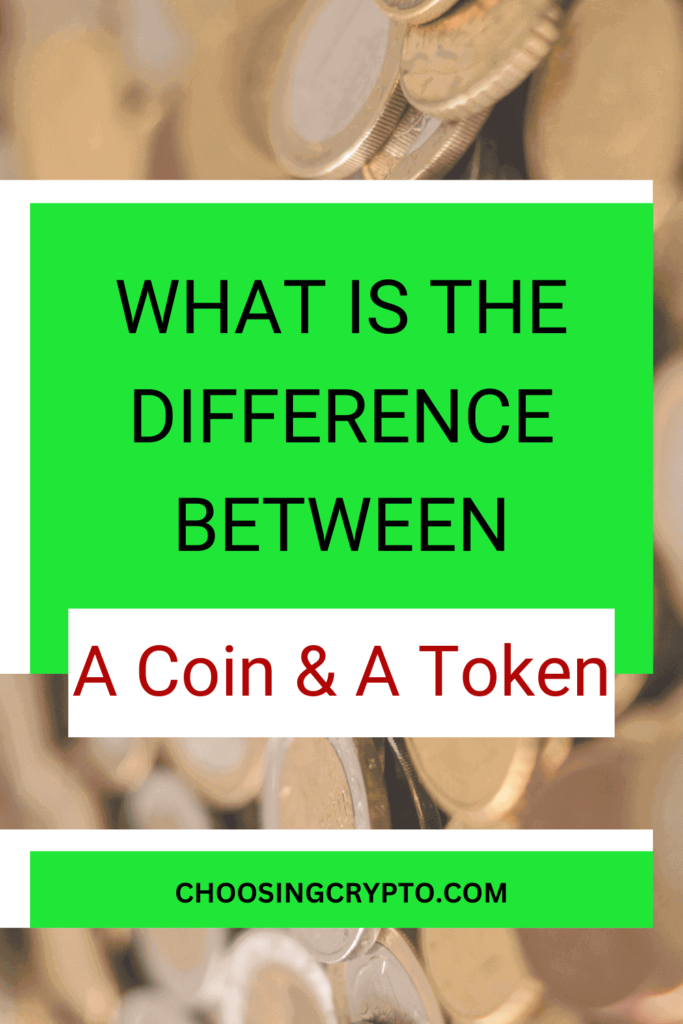What do you think is the difference between a coin and a token in cryptocurrency?
If you have ever wondered why some cryptocurrencies are labeled as “coins” while others are called “tokens”, you’re in the right place.
Though “coins” and “tokens” are often used interchangeably, they have distinct features and uses. Understanding these differences is essential for anyone aiming to navigate the crypto market efficiently.
In this blog post, I’ll explain the differences between a coin and a token in a straightforward, easy-to-understand manner.
Whether you’re just starting out or looking to deepen your understanding, this guide will provide the clarity you need.
What is a Coin?
A coin is a type of cryptocurrency that functions on its own dedicated blockchain.
Picture a blockchain as a digital ledger that records all transactions involving that coin.
Each coin operates on its unique blockchain, which is the technology enabling its functionality.
Examples of Coins
- Bitcoin (BTC): The first and most recognized cryptocurrency, often called digital gold.
- Ethereum (ETH): Known for its ability to execute smart contracts, it offers more than just a currency.
- Litecoin (LTC): Designed as the silver to Bitcoin’s gold, providing quicker transaction times.
Characteristics of Coins
- Native to Their Own Blockchain: Coins are distinct because they reside on their own blockchain. For example, Bitcoin exists on the Bitcoin blockchain, and Ether (ETH) exists on the Ethereum blockchain. These blockchains operate independently and have their own protocols and structures.
- Medium of Exchange: Coins primarily function as a form of digital currency. They can be used to purchase goods and services, similar to traditional money. Bitcoin, for example, is often referred to as “digital gold” because it is used as a store of value.
- Store of Value: Many individuals hold coins as investments, anticipating that their value will grow over time. Coins like Bitcoin and Ethereum are popular choices for long-term investment due to their established reputations and broad acceptance.
What is a Token?
A token is a type of cryptocurrency that is built on top of an existing blockchain.
Unlike coins, which have their own blockchains, tokens depend on another blockchain’s infrastructure, such as Ethereum, Binance Smart Chain, or Solana.
Examples of Tokens
- Chainlink (LINK): An ERC-20 token on the Ethereum blockchain that delivers decentralized Oracle services, enabling smart contracts to securely interact with real-world data.
- Uniswap (UNI): Also an ERC-20 token, UNI serves as the governance token for the Uniswap decentralized exchange, allowing holders to vote on platform modifications and upgrades.
- Tether (USDT): A stablecoin token pegged to the US dollar, designed to provide stability in the often unpredictable crypto market.
Characteristics of Tokens
- Built on Existing Blockchains: Tokens are created on top of existing blockchain platforms, with Ethereum being the most common. These tokens often follow the ERC-20 standard, simplifying the creation and management process without needing a new blockchain.
- Versatile Use Cases: Tokens can represent a variety of assets and serve multiple purposes beyond currency. They can be utility tokens that offer access to a product or service or security tokens that signify ownership of an asset or company.
- Smart Contracts: Tokens frequently utilize smart contracts—self-executing contracts with terms written directly into code. This feature enables automated transactions and processes, enhancing token functionality.
Key Differences Between a Coin and a Token
Now that we’ve discussed the definitions of a coin and a token, let’s go into the key differences between them.
Blockchain
- Coins: Coins function on their own independent blockchains. For instance, Bitcoin operates on the Bitcoin blockchain and Ethereum functions on the Ethereum blockchain.
- Tokens: Tokens are created on pre-existing blockchains. They don’t possess their own blockchain and instead use the infrastructure of another blockchain, such as Ethereum, Solana, or Binance Smart Chain.
Creation
- Coins: Coins are generally produced through mining or staking, depending on the blockchain’s consensus mechanism.
- Tokens: Tokens are usually generated through an Initial Coin Offering (ICO) or a Token Generation Event (TGE). This process is generally simpler and less resource-intensive than mining.
Functionality
- Coins: Primarily, coins act as digital currency. They can be used to purchase goods and services, transferred to others, or held as an investment. Their main roles include serving as a medium of exchange, a store of value, and a unit of account.
- Tokens: Tokens have diverse functions within their respective ecosystems. Utility tokens grant access to services or products on a platform, security tokens signify ownership of assets, and stablecoins are used to maintain a stable value for transactions and trading.
Additional Resources:
- How to Store Your Cryptocurrencies Safely
- How to Secure Your Crypto from Hacks
- Top Cryptocurrencies to Invest In
- How to Evaluate a Cryptocurrency Project
And guess what? We’re also on Instagram and Twitter(X). Join us there for even more fun and useful content!

DISCLAIMER:
The information provided here is intended for informational purposes only and should not be solely relied upon for making investment decisions. It does not constitute financial, tax, legal, or accounting advice. Additionally, I strongly recommend that you only invest in cryptocurrency an amount you are comfortable with potentially losing temporarily.
